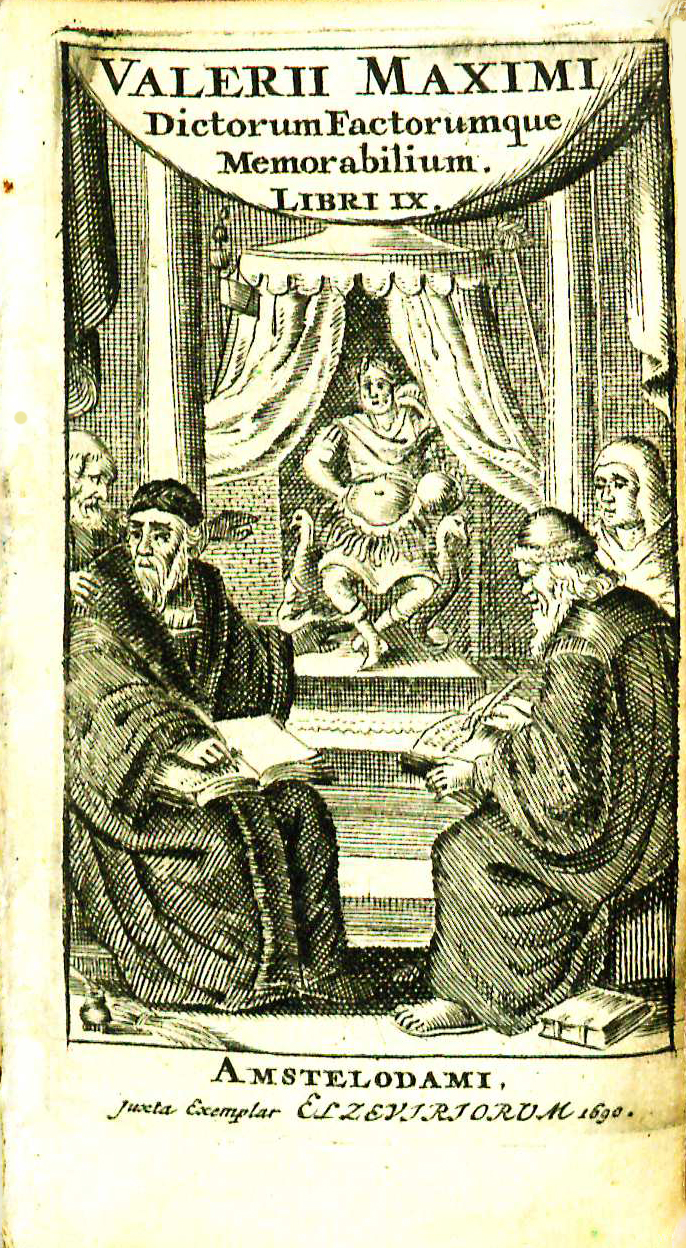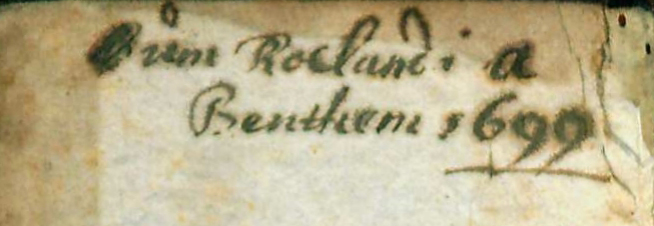Difference between revisions of "Valerii Maximi Dictorum Factorumque Memorabilium"
(Created page with "{{DISPLAYTITLE:''Valerii Maximi Dictorum Factorumque Memorabilium''}} <big>''Valerii Maximi Dictorum Factorumque Memorabilium: Libri IX''</big> __NOTOC__ {{BookPageInfoBox |im...") |
|||
| Line 1: | Line 1: | ||
{{DISPLAYTITLE:''Valerii Maximi Dictorum Factorumque Memorabilium''}} | {{DISPLAYTITLE:''Valerii Maximi Dictorum Factorumque Memorabilium''}} | ||
| + | ===by Valerius Maximus=== | ||
<big>''Valerii Maximi Dictorum Factorumque Memorabilium: Libri IX''</big> | <big>''Valerii Maximi Dictorum Factorumque Memorabilium: Libri IX''</big> | ||
__NOTOC__ | __NOTOC__ | ||
{{BookPageInfoBox | {{BookPageInfoBox | ||
| − | |imagename= | + | |imagename=DictorumFactorumqueMemorabilium1690TitlePage.jpg |
|link=https://catalog.swem.wm.edu/law/Record/4017592 | |link=https://catalog.swem.wm.edu/law/Record/4017592 | ||
|shorttitle=Valerii Maximi Dictorum Factorumque Memorabilium | |shorttitle=Valerii Maximi Dictorum Factorumque Memorabilium | ||
| − | |commontitle= | + | |commontitle= |
|lang=Latin | |lang=Latin | ||
|publoc=Amstelodami | |publoc=Amstelodami | ||
| Line 12: | Line 13: | ||
|year=1690 | |year=1690 | ||
|pages=4, 328 | |pages=4, 328 | ||
| − | |desc= (14 cm.) | + | |desc=12mo. (14 cm.) |
| − | }} | + | }}Historians know very little about the life of early first century C.E. writer, [http://en.wikipedia.org/wiki/Valerius_Maximus Valerius Maximus] (c. Reign of Emperor Tiberius 14 C.E. – 37 C.E.) except that he was the friend of Sextus Pompeius (consul in 14 C.E.) and may have accompanied Pompeius on his governorship to Asia.<ref>''The Oxford Companion to Classical Literature'', s. v. "[http://www.oxfordreference.com/view/10.1093/acref/9780199548545.001.0001/acref-9780199548545-e-3052 Valē'rius Maximus]" (Oxford: Oxford University Press, 2011), accessed October 10, 2014.</ref> His praenomen (personal name) remains unknown. |
| + | |||
| + | Valerius published ''Dictorum Factorumque Memorabilium Libri IX'' (Nine Books of Memorable Deeds and Sayings) c. 31 C.E. This compilation of contemporary conventional wisdom is divided as follows: Book I, religion, omens, prophecies; Book II, social customs; Books III-VI, virtuous conduct; Books VII–VIII, a varied group including good fortune, military strategy, law suits, eloquence, and others; Book IX, evil conduct. Valerius dedicated the work to the reigning emperor, Tiberius, and consistently flatters him throughout. He drew upon other writers including Cicero, Livy, and Varro to create a "turgid and bombastic style."<ref>''Who’s Who in the Roman World'', s.v. "[http://search.credoreference.com/content/entry/routwwromwor/valerius_maximus_1st_century_ad/0 Valerius Maximus (1st Century Ad)]" (London: Routledge, 2001), accessed October 10, 2014.</ref> | ||
| + | |||
==Evidence for Inclusion in Wythe's Library== | ==Evidence for Inclusion in Wythe's Library== | ||
| + | [[File:DictorumFactorumqueMemorabilium1690Inscription.jpg|left|thumb|300px|<center>Inscription, front pastedown.</center>]] | ||
| + | Listed in the [[Jefferson Inventory]] of [[Wythe's Library]] as "Valerius Maximus. 12mo." and given by [[Thomas Jefferson]] to his grandson [[Thomas Jefferson Randolph]]. The [https://digitalarchive.wm.edu/handle/10288/13433 Brown Bibliography]<ref>Bennie Brown, "The Library of George Wythe of Williamsburg and Richmond," (unpublished manuscript, May, 2012) Microsoft Word file. Earlier edition available at: https://digitalarchive.wm.edu/handle/10288/13433.</ref> suggests either the 1673 London edition, a 24mo. edition, or the 1602 edition published in Geneva. [http://www.librarything.com/profile/GeorgeWythe George Wythe's Library]<ref>''LibraryThing'', s.v. "[http://www.librarything.com/profile/GeorgeWythe Member: George Wythe]," accessed on February 3, 2015.</ref> on LibraryThing simply states "Precise edition unknown." Since the edition Wythe owned cannot be determined, the Wolf Law Library purchased an available copy of a 1690 edition published in Amsterdam. | ||
==Description of the Wolf Law Library's copy== | ==Description of the Wolf Law Library's copy== | ||
| − | Bound in contemporary calf with three raised bands, gilt filigree compartments, and black morocco label. Front pastedown inscribed "Roelandi a Bentham1699. | + | Bound in contemporary calf with three raised bands, gilt filigree compartments, and black morocco label. Front pastedown inscribed "Roelandi a Bentham1699." |
View this book in [https://catalog.swem.wm.edu/law/Record/4017592 William & Mary's online catalog.] | View this book in [https://catalog.swem.wm.edu/law/Record/4017592 William & Mary's online catalog.] | ||
Revision as of 14:02, 4 February 2015
by Valerius Maximus
Valerii Maximi Dictorum Factorumque Memorabilium: Libri IX
| Valerii Maximi Dictorum Factorumque Memorabilium | |
|
Title page from Valerii Maximi Dictorum Factorumque Memorabilium, George Wythe Collection, Wolf Law Library, College of William & Mary. | |
| Published | Amstelodami: Juxta exemplar Elzevirirum |
| Date | 1690 |
| Language | Latin |
| Pages | 4, 328 |
| Desc. | 12mo. (14 cm.) |
Historians know very little about the life of early first century C.E. writer, Valerius Maximus (c. Reign of Emperor Tiberius 14 C.E. – 37 C.E.) except that he was the friend of Sextus Pompeius (consul in 14 C.E.) and may have accompanied Pompeius on his governorship to Asia.[1] His praenomen (personal name) remains unknown.
Valerius published Dictorum Factorumque Memorabilium Libri IX (Nine Books of Memorable Deeds and Sayings) c. 31 C.E. This compilation of contemporary conventional wisdom is divided as follows: Book I, religion, omens, prophecies; Book II, social customs; Books III-VI, virtuous conduct; Books VII–VIII, a varied group including good fortune, military strategy, law suits, eloquence, and others; Book IX, evil conduct. Valerius dedicated the work to the reigning emperor, Tiberius, and consistently flatters him throughout. He drew upon other writers including Cicero, Livy, and Varro to create a "turgid and bombastic style."[2]
Evidence for Inclusion in Wythe's Library
Listed in the Jefferson Inventory of Wythe's Library as "Valerius Maximus. 12mo." and given by Thomas Jefferson to his grandson Thomas Jefferson Randolph. The Brown Bibliography[3] suggests either the 1673 London edition, a 24mo. edition, or the 1602 edition published in Geneva. George Wythe's Library[4] on LibraryThing simply states "Precise edition unknown." Since the edition Wythe owned cannot be determined, the Wolf Law Library purchased an available copy of a 1690 edition published in Amsterdam.
Description of the Wolf Law Library's copy
Bound in contemporary calf with three raised bands, gilt filigree compartments, and black morocco label. Front pastedown inscribed "Roelandi a Bentham1699."
View this book in William & Mary's online catalog.
References
- ↑ The Oxford Companion to Classical Literature, s. v. "Valē'rius Maximus" (Oxford: Oxford University Press, 2011), accessed October 10, 2014.
- ↑ Who’s Who in the Roman World, s.v. "Valerius Maximus (1st Century Ad)" (London: Routledge, 2001), accessed October 10, 2014.
- ↑ Bennie Brown, "The Library of George Wythe of Williamsburg and Richmond," (unpublished manuscript, May, 2012) Microsoft Word file. Earlier edition available at: https://digitalarchive.wm.edu/handle/10288/13433.
- ↑ LibraryThing, s.v. "Member: George Wythe," accessed on February 3, 2015.

